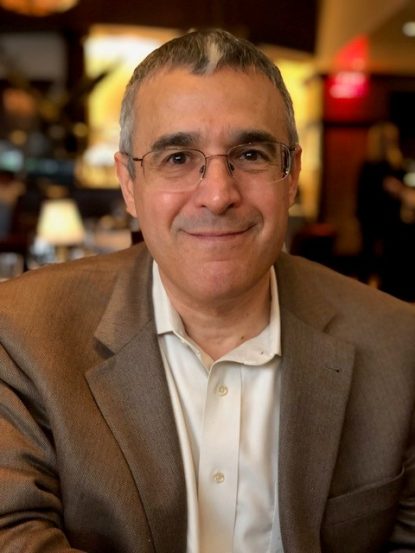
Dr. John M. Travaline, director of the Pulmonary Procedure Unit at Temple University Hospital and a permanent deacon serving at Mary, Mother of the Redeemer Parish, was recognized with the Catholic Medical Association’s Distinguished Guardian of the Faith award for his exemplary integration of Catholic ethics and compassionate care in clinical practice.
People who meet Dr. John M. Travaline in his practice tend to notice the kind of expertise that the director of Temple University Hospital’s Pulmonary Procedure Unit can bring to their care.
They also find in him the faith, compassion, and pastoral presence of a permanent deacon ordained for 13 years and serving at Mary, Mother of the Redeemer Parish in North Wales.
That sense of pastoral care, combined with his commitment to Catholic ethics, has earned Travaline the Catholic Medical Association’s Distinguished Guardian of the Faith award, given at their national convention in Kansas City in September.
“I see it as a gentle affirmation of being on the right track. I’m not seeking to be noticed per se for that, but a gentle affirmation,” said Travaline, who is also on the faculty at Temple Medical School and teaches Catholic studies at Seton Hall University. He was unable to attend the event last month in person.
“If I can bring through my talents, my belief and faith, and share that in a gentle way with the husband or the children or the patient themselves, many times a weight is lifted from them. They can maybe see the peace of Christ there, the love of Christ there in that agonizing situation.”
There aren’t many doctors whose curriculum vitae includes the date of their baptism — in Travaline’s case, Feb. 24, 1963 at Immaculate Heart of Mary Parish in Philadelphia’s Roxborough section.
It seems appropriate that the Malvern Prep and St. Joseph’s University graduate would simultaneously study for a master’s degree in theology at Villanova while getting his doctorate at Jefferson Medical College. This doctor has always walked with one foot in the pathway of growing in his faith, with the other on the path of growing in the medical profession.
“For whatever reason, I remember as a young child having aspirations that I wanted to be a doctor,” Travaline said. “It certainly was supported by family members who cultivated and encouraged that kind of thought
A Cursillo retreat while in his junior year at Malvern Preparatory School led to his “conversion experience” in which “I really met Jesus and it was personal,” Travaline said. “I was and continue to be very intellectually engaged with theology as it’s just a love of mine.”
Catholicism united Travaline and a medical school friend of his as they became roommates and brothers in faith pursuing their vocations in the medial field.
There must have been something in the water in their apartment, because both Travaline and Dr. Greg Burke of Danville, Pa. received the Distinguished Guardian of the Faith award this year.
“I think it was the Holy Spirit that brought us together. We just connected,” said Travaline. “I was more of that brainy academic theological sort of bent, and he was like, ‘Let’s go to St. John’s daily Mass. Let’s go to confession.”
They both are dedicated to their calling in Catholic medicine, injecting a deeper ethical code and a more present sense of compassionate care into everyday relationships with patients — something Travaline says stems from his faith.
“I don’t see them as separate,” said Travaline who often lectures and presents talks on topics concerning ethics and end-of-life issues, even the link between medicine and St. John Paul II’s Theology of the Body.
“You’re approaching an ethical dilemma that a patient or a team is undergoing, but you approach it with the love of Christ and showing true compassion, love for the patient, care and true concern for the patient, their families. Many times, the dilemma melts away.”
That same compassion and love sounds like the charism of a deacon, something he has lived the last dozen years while also loving Cathy, his wife of 37 years, their four children and three grandchildren.
His path to the diaconate began one year at his parish where he was serving as a lector.
“We were standing in the back (of church) ready to process out, and the pastor taps me on the shoulder and says, ‘Have you ever thought about being a deacon?’ I said, ‘No, I’m not really sure,’” Travaline said.
“I mentioned it to my wife. She seemed to know like there was more significance to that than I did. She (said), ‘Oh no, he asked you to be what?’ That Easter Monday, I called the archdiocese. One thing led to another. I was simply asked unexpectedly, and was open to it as was my wife, and things happened.”
Travaline’s advice for any Catholic who wants to enter the medical field or religious life seems to ring universally for anyone. “Make sure that the base upon which they stand is secure and firm, a respect for who we are, our identity as sons and daughters of the Father, understanding who we are as a human person in connection with God,” he said.
“That has to be foundational going in. Those that want to live out faith in medicine must always come back to that. How do I be compassionate? And stay close to the Lord, tap into others in spiritual direction, the sacraments, the Eucharist and confession for sure, but go deeper into ways that we love others.”
PREVIOUS: Neumann Goretti Senior Leads Students in Writing Letters to Military Members
NEXT: Archdiocesan Pastoral Center to Relocate in Center City Philadelphia Next Year


Share this story